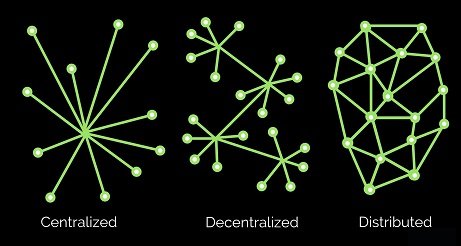
The hottest of hot takes.
Look above at the infographic. What is the difference between centralization and decentralization? Doesn't a decentralized system pretty much look EXACTLY like a centralized system? This is not an accident. A decentralized system is just a centralized system with more peers at the top level. There is no such thing as decentralized or centralized as most have come to understand it. It's a spectrum and a matter of opinion in a lot of cases.
If I run a crypto node, I have 100% control over that node. I can do anything with that server that I want. It's purely 100% centralized to my control. I own it. This is what a lot of people within this space can't quite seem to grasp because the technical aspects of crypto are very hard to get just by reading about it and having it explained by others. The only way to truly start understanding this stuff is to get out there and participate. Most will never do this, and that's fine.
This is the way it's supposed to be.
Most people don't know how their car or phone works. The frontend is massively dumbed down for mainstream consumption. Very few need to know how it works; only that it does. This is the definition of economics as a whole and the entire human condition. Each individual performs a small task for the greater good (in theory) and we all share the overall benefits.
We just have to remember that the opinions of those who have no idea what they are talking about don't matter much. When it comes to objective fact, people are not entitled to their opinion. And yet we live in a world where everyone thinks they get to have an opinion because the powers that manipulate public opinion encourage such behavior to their own benefit.

The value of Custodial Accounts
We always see people complaining about how crypto is centralized in such and such way. Blackrock is centralized! Distribution is centralized! Centralized exchanges are centralized! Who cares? The nodes that run the entire goddamn system are centralized. It means nothing. The network as a whole is DECENTRALIZED, because again look at the infographic: decentralization means a network of centralized nodes in consensus. That is the literal definition. Decentralization ironically includes centralization as a required subset.
So it doesn't matter if this or that thing is centralized. Simply the fact that decentralization is an option makes it decentralized. It does not matter of a centralized custodian is gaining a lot of popularity. That's just part of the process. How many cycles do we have to personally experience before we understand these simple truths? They are self-evident.
When FTX gains massive popularity, and then all the plebs pile their life savings into FTX: they learn a valuable hard lesson. These hard lessons aren't going to get better over time. They will get much worse until more people understand they need to be more mindful of their own security. Mainstream adoption will bring more awareness it's true, but it will be accompanied by even more ignorance than ever before. This is undeniable and plays out the same every time no matter what technological adoption curve we are talking about. Grandma and Email are not friends.
The choice is what makes decentralization.
The fact that people have a choice who stores their data and who doesn't makes all the difference in the world. If you create a Facebook account, who holds the data? Do you get to choose? Do you get any say over anything whatsoever? Of course not. Facebook owns the account, and by extension the user and their entire brand.
"Free service" indeed!
But when you make a choice to store your Bitcoin on Coinbase or Fidelity it doesn't really matter from a global perspective. It's only going to matter to the individuals that made that choice. Simply having the choice to store our own keys and participate in our own security makes the thing quite decentralized.
In fact the choice to outsource risk to custodians makes the network more decentralized, not less. If I store all my crypto on a hardware wallet... that's not safe. I could lose it all in a single hack or even just user error. It happens all the time. The fact that custodians exist allow me to decentralize my assets across all the options.

What's more decentralized?
100% of everything on a Trezor that constantly gets firmware updates and frontend input from a centralized company incorporated in the Czech Republic? Or would it be smarter to spread my shit out across multiple exchanges, phone wallets, browser extensions, and hardware wallets? It should be obvious that our security gets better even if we choose to store some of our crypto on centralized exchanges. How much that should be is completely up for debate.
Maybe it's 10% on a single exchange. Maybe it's 1% across five exchanges. But it is something; it's not zero as many like to pretend. This should be obvious, but it somehow is not due to collective delusion and the backlash we constantly experience from overallocations in the wrong direction. Too many people lose their entire stack when a single exchange goes under so we all collectively just say, "FUCK IT! NEVER HOLD ANYTHING ON AN EXCHANGE: YOU'VE BEEN WARNED." It's not terrible advice, but it's also not good advice. Again, that kind of attitude is only good for dumbing down the issue for novice users and mainstream consumption.
It's a numbers game, boys and girls
Imagine you're a vegan. You want people to stop eating meat because factory farming is absolutely disgusting (which it is). Would you rather convince one other person to become vegan, or would you instead choose to get 1000 people to reduce their animal consumption by half? Any rational person is going to choose the latter option because the math shows that 1000 people consuming half as much is the same as creating 500 new vegans instead of 1. It's x500 times more effective. And yet most people do not think like this, about anything.
Centralized custodians employ the same concept.
Would you rather get 1000 people to sign up on Coinbase or get 1 person to understand the importance of owning their private keys? Centralized custodians are the key to mainstream adoption, and yet all the most hardcore crypto users are completely blinded by this and want to play the "Everyone should be educated about everything" game. As described earlier, that's not how the economy or life works. Be reasonable.

Lite Accounts
Surprisingly enough I think the way Hive is handling business is actually quite ingenious. We are creating centralized custodial accounts, but they are heavily linked directly to their decentralized counterparts. Everyone knows how to sign up for things with their email address, Google account, or Facebook. It's easy and they've already been trained. The other side of this blade contains the expectation that email recovery accounts are going to be an option.
The real question that needs answering:
How much monetary risk should one accept on a custodial account? The answer is different for everyone, both percentage wise and flat dollar value. I think that most of us would agree that anything over 10% in a single place is pushing it. Luckily for us new accounts on Hive are worth near $0 and income can be earned rather than invested. This is the perfect recipe for custodial accounts in terms of mitigating risk while also building infrastructure that leads to mainstream adoption.
Conclusion
Choosing a centralized option doesn't make something centralized. In fact, the choice's existence in the first place implies heavy decentralization. New users will always get burned by shiny new things. We can't stop that from happening, nor would we want to. Some people simply need to learn the hard way. Conflating our own impatience with centralization is a big mistake. To expect these massive societal transitions are going to happen within a short time period is completely unrealistic.